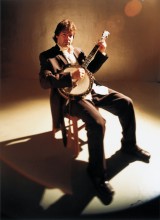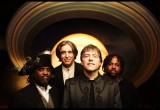Tales From The Road
The Man Who Reinvented the Banjo: Bèla Fleck and his original Flecktones are coming to town

Bela Fleck

The Original Flecktones
The banjo is a uniquely American instrument. Originally brought over from Africa by slaves, the “banjer” was a gourd instrument with a neck and strings. This early banjo evolved into the banjo we associate with minstrel shows from the late 1800s and with Dixieland jazz, strummed with a pick. In the modern era the banjo has undergone at least two remarkable revolutions in playing style and in the musical concepts of how it can be used.
The first revolution was ushered in by Earl Scruggs who invented the three-finger roll style of banjo playing in the 1940s, which catapulted the banjo to the forefront of the new musical genre called “bluegrass,” and it introduced the banjo as a melodic instrument capable of playing melody lines and not just being strummed by a pick. The second revolution was introduced by Bèla Fleck in the 1970s and ’80s as he showed the versatility of the banjo and its ability to play music other than bluegrass, including classical, African, jazz, and fusion.
Fleck first made a splash in the musical world as a young banjo prodigy in the early 1970s as a member of Newgrass Revival, which ushered in the era of progressive bluegrass music. He continued his innovative ways in founding the seminal super group Bèla Fleck and the Flecktones in the 1980s, which has won multiple awards including five Grammys. In what is sure to be a great concert, Bèla and the original lineup of the Flecktones bring their voluminous talents, along with Bèla’s unique approach to the banjo, to San Diego’s Anthology on March 13 and 14.
The original Flecktones appearing for this performance are: RoyEl “Futureman” who has invented and plays his own unique drums and percussion instruments and Victor Wooton on bass who has been regaled as the most influential bassist since Jaco Pastorius. Howard Levy, recognized as the best of the best diatonic harmonica players and a top piano player, is a driving innovator of the group whose musical adventures include journeys into jazz, pop, rock, world music, Latin, classical, folk, blues, country, theater, and film. He has appeared on hundreds of CDs, won a Grammy (1997), won a Joseph Jefferson Award (1986) for Best Original Music for a Play, and has performed many times on American and European television and radio.
Fleck first united the Flecktones in 1988, ostensibly for a single performance on PBS’ “Lonesome Pine Special.” From the start, there was a special kinship among the four musicians, a bond forged by a mutual passion for creativity and artistic advancement. Three breakthrough albums and a whole lot of live dates followed before Levy decided to move on in late 1992. Béla Fleck and the Flecktones persevered, playing as a trio and with many special guests, before saxophonist Jeff Coffin joined the ensemble. A succession of acclaimed albums and innumerable live performances continued to earn the band a fervent fan following around the world, not to mention five Grammy awards in a range of categories.
Still, by 2008, the band had grown restive and took a temporary hiatus. Coffin was invited to join the Dave Matthews Band after the 2008 death of saxophonist LeRoi Moore. Fleck encouraged him to accept, believing the decision would rejuvenate both DMB and the Flecktones themselves. “We were ready for something different to happen,” he says. “We’d been in a kind of holding pattern. We had the same line-up for so many years that it was becoming ‘normal’; we were all drifting into outside things for new musical invigoration, and we were taking more and more time off between albums and tours.” Each member had been busy with a variety of successful outside projects including: Bèla’s duet collaborations with Chick Corea, a trio with Zakir Hussain and Edgar Meyer (sometimes with the Detroit Symphony), his expansive adventures in African music, documented in the acclaimed 2009 film and CD, Throw Down Your Heart, and in a trip to China to share his banjo music with Chinese folk players. Meanwhile, Victor Wooton was pursuing solo band tours, camps, recording sessions, clinics and CD releases (including an incredible collaborative project with Stanley Clarke and Marcus Miller called SMV, which yielded the album Thunder), and Future Man was busy with his creation of the amazing Black Mozart project and continued development of new instruments. Still, all agree that the Flecktones’ music was beckoning them home. The band, which had always maintained a warm relationship with the gifted pianist/harmonica player, recruited Levy for a 2009 tour of the US and Europe, an experience he describes as “extremely invigorating and very energizing.” For Fleck, Levy’s return enables the Flecktones to follow through on the original concept of a band “where each person was reinventing their instruments, where every one of us was a kind of mutant.” “There’s a special thing that happens when the four of us get together and play,” notes Levy. “We all have the same attitude of trying to do things that we haven’t done before and, coincidentally, no one else has either.” One thing was certain, however. The “original” Flecktones were resolute that their reunion would not be rooted in nostalgia. The goal from the get-go was to drive the music forward to places where it might’ve progressed had things gone differently. “I didn’t want to just get together to play the old music,” Fleck says. “That’s not what the Flecktones are about. Everybody’s full of life and ideas and creativity. I was intrigued by what we could do that we had never done before.” In early 2010, Fleck and Levy first began working on new material. Their compositional collaboration resulted in a remarkable suite comprised of “Joyful Spring” and “Life In Eleven.” “When we got together, the 11 idea [playing in an 11-beat time signature] came back up and Howard came out with something very Bulgarian,” he says. “I said, ‘It’s really great but it’s really fast and jumpy and complex. What if, halfway through, we dropped into a gospel 11/4 feel that was so natural, that you didn’t even notice it was in 11?’
“When we play together, Victor, Futureman, and I all have to step up our game,” Fleck says, “because Howard is going to throw something unexpected at us, which in certain ways, puts us in an uncomfortable zone, but due to that, we have to push through — into our higher selves.” For many Flecktones fans, the return of the original line-up allows a chance to see a band that many had never gotten to witness before. “There are people who don’t remember the very beginning of the Flecktones,” Futureman says. “It’s like people that started watching Star Trek: The Next Generation and never got to meet Captain Kirk. So here we go, the original crew of the Enterprise coming together on a new mission.”
Bèla Fleck and the original Flecktones are at Anthology March 13 and 14, with two shows each night, 7:30 and 9:30pm. Tickets are $19-$59. For tickets and information visit anthology at: http://anthologysd.com/index.html, but hurry the early show on the 13th is already sold out as this article is written.










